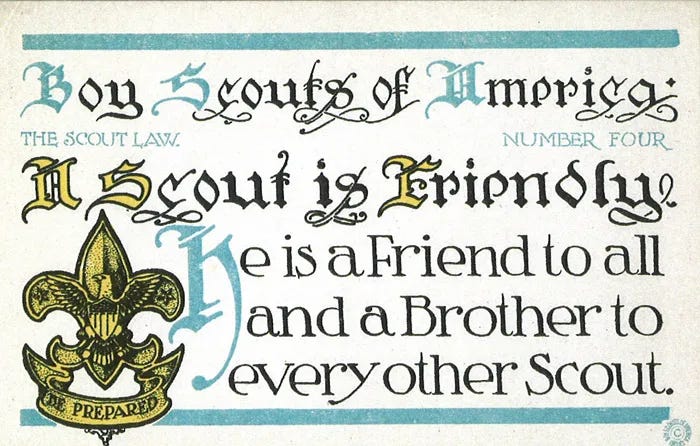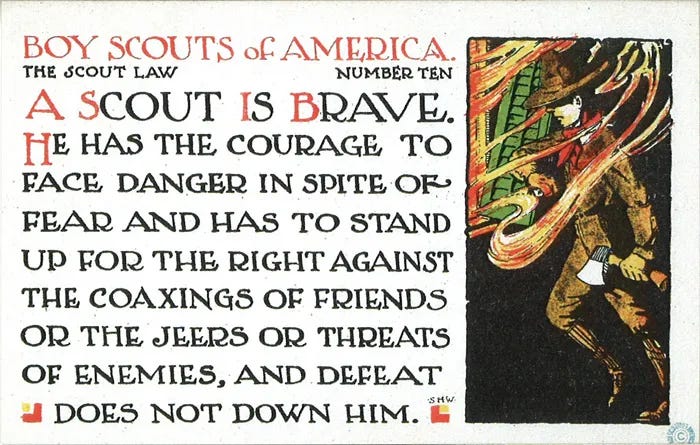Friendly, Courteous, & Kind?
I shared this “sermon” as the inspirational message during a Scouting interfaith worship service. The service was part of an adult leader training called Wood Badge that I recently attended. It was delivered to an almost entirely white audience and was intended to show how work in Diversity, Equity and Inclusion align with the Scout Law – and intended to challenge them to actively engage in Scouting DEI work.
I’ve often wondered about the twelve words chosen for the Scout Law – particularly words like Friendly, Courteous and Kind, which seem to be synonyms.
Are they redundant? Are they interconnected? Has our modern English lost some nuance originally found in the words 100 years ago?
I couldn’t find an online dictionary with definitions from a century years ago. And when I looked in current online dictionaries, each word was often used to describe the others or as synonyms.
So, I moved on to Scouting resources. In looking at various online sources I compiled the following:
Friendly: A Scout is a friend to all. They are a brother and sister to other Scouts. A Scout knows that friendship is a mirror. When you have a smile on your face as you greet someone, you will probably receive a smile in return.
Courteous: A Scout is polite to everyone regardless of age or position. A Scout takes the time to hold doors open for other people, to pick things up off the floor. A Scout offers their seat to someone who needs it more.
Kind: A Scout understands there is strength in being gentle. They treat others as they want to be treated. To be kind you must look beyond yourself and try to understand the needs of others; take time to listen to people and imagine being in their place.
As I look at these in order, I see a progression: Friendly > Courteous > Kind. This morning I would like to share with you my thoughts on these three words and share my experiences as a Cubmaster (the “quoted” sections below) attempting to model them for my Cubs and their families.
Friendly is about outward appearances and initial impressions. It is as simple as a smile or a wave. It requires nothing of us. No sacrifice. But it is necessary, and it is foundational. When I was a Cubmaster I told this story:
Last week I was at Kroger getting gas. A man who looked nothing like me pulled up on the opposite side of the pump I was using. As he came around to pump his gas, I smiled at him and said, “Good morning”. That simple gesture brought an instant smile to his face.
He greeted me back and began to pump his gas. As soon as he had his pump set, he came back and struck up a conversation with me. We chatted about the weather that day (it was hot), what weather we hoped for that summer (cool), and what we each had planned for Mother’s Day.
We said goodbye and each went our separate ways, both a little brighter and happier for the conversation. A little friendliness can bring big happiness to both you and the people around you.
In my monthly Cubmaster Minutes I would talk to my Cubs about easy and practical ways to be Friendly. Helping a teacher is easy for Cubs to understand. I would also talk to them about being a friend to someone who needed it. Find someone who was playing or eating alone. Be their friend – especially if they don’t look like you. Simple yet concrete actions for young minds.
Courteous takes things one step further. It moves from first impressions to actions. Being courteous often means to delay (waiting to hold a door) or deny (giving up your seat or allowing someone to merge in traffic) yourself. Being courteous means you slow down and begin to think of others needs in the immediate moment.
We live in an extremely fast paced world, with the world’s information at our fingertips. (The world’s information, and cat GIFs.) We have instant access to friends and family around the globe via phone calls, texts, video calls and various social media platforms.
We can order virtually anything to our doors within days, if not hours. And we often measure time in the Chick-Fil-A drive-through in seconds, not minutes. We are not a society that embraces delayed satisfaction – even in the slightest.
But courtesy calls us to deny ourselves just in the slightest ways, to put others before ourselves. It’s the slightest of actions, but it could mean the world to the person on the receiving end.
Courteous acts help people be seen, to know that they aren’t invisible in the world. I’ve often told Scouts that simply holding a door open shows other people that you recognize you aren’t the only person in the world.
I recently heard an analogy describing the differences between Diversity, Equity and Inclusion:
Diversity is giving someone a seat at your table. Equity is giving them a plate so they can eat. And inclusion is letting them help plan the menu.
I think giving a seat is friendly. It doesn’t cost the giver anything. We usually have extra chairs and adding one to the table is easy. But giving someone a plate recognizes someone and makes them feel seen. It requires the giver to provide not only the plate and food, but also space at the table, and the time to eat.
When I became Cubmaster of Pack 404, the unit had shrunk to only 25 Cubs. In the next year half of that group would be crossing over into Scouts BSA, and only one Cub on the entire roster was black.
I began working diligently on a recruiting plan that would bolster the unit’s numbers and increase our diversity. At that time, and since, I’ve had Scouting volunteers tell me that it’s not possible to directly recruit diverse Scouts from underserved populations.
I respectfully disagree, because that is exactly what I did. When we held recruiting events, I as Cubmaster would specifically spend time talking to black families. I would speak openly and plainly.
I would say, “Scouting has historically underserved black families and black communities. I am trying to change that. I recognize that your family may be the only one in that looks like you in the den. But if you join and stay, when the next black family visits, they will see faces that look like theirs.”
To return to the table analogy, I was setting a place for these families. I was being intentional about creating space and sending invitations for the meal.
And we were successful in our efforts. Initially we had one black Scout out of 25 – just 4% of our pack. Six weeks later our pack had grown to 65 Cubs, with seven black Scouts on the roster – now representing more than 10% of our Cubs.
I also recruited neurodiverse Scouts and girls into the program with the same intentionality. Of the 22 girls to join Cub Scouts in our district, half were part of my pack. (This was the first year girls could join Cub Scouts.)
In the end it’s still a small thing, but sharing a table with someone can be life-changing. Most every faith tradition teaches that sharing a table is the path to understanding, peace and reconciliation. You just have to be intentional.
Kindness is where Friendly and Courteous really take up residence as part of your character. Beyond considering people’s immediate needs, Kindness means you begin to “walk a mile in their shoes” and strive for a deeper understanding of people – particularly people whom you don’t know, are different than you, or with whom you don’t agree.
Kindness becomes a way of life, not just spur of the moment ideas and actions. Living a life of kindness results in you allowing grace to lead you. You will always assume that people have good intentions and are worth the “benefit of the doubt.”
Kindness recognizes that we all have our own struggles, and that many times, if not most times, those struggles aren’t visible to those around us. Kindness draws us into fellowship with others and calls us to create community where we care for each other. Community where we sacrifice for each other, and where we forgive each other.
Going back to my table analogy, kindness calls us to be inclusive. It calls us to stop seeing people different from us as “the other” but to include them as equals at our table. Kindness calls us to bring them in before the table is set to help design the space and the menu and to help ensure their needs are met.
In Scouting menu planning is something that we literally do. As my Cub Scout pack recruited Indian families, we needed to ensure that we had vegetarian options available for meals while camping and at events.
At our spring campout the Webelos den made both a traditional lasagna and a veggie lasagna. And guess which one the Scouts liked better? The vegetarian.
My last year as Cubmaster we offered classes for our Cubs to earn their religious awards. This was easy to do for my Christian Scouts, as the books are at the Scout Shop. But when my Indian families confirmed their Scouts wanted to earn their awards as well, I was determined to make that happen – even though I didn’t know how.
After finding the program information and course materials online, I visited the Sri Meenakshi Temple in Pearland, and found people who could help. I was able to develop a relationship with teachers at the Vedic Heritage School.
The school knew it had Scouts in attendance at its school but didn’t know a Hindu religious awards were available. The school now offers both the Cub Scout Dharma and Scouts BSA Karma awards to Hindu scouts in the area. That first year I was invited to their end of school program to present my Cubs with their awards. It was an amazing experience.
Did you know that Pearland is home to one of the largest and most famous Hindu temples in the US, and only one of three built since the 1970s? The complex sits on five acres and has a large peacock enclosure. They also serve amazing South Indian vegetarian food in their cafeteria on the weekends.
I was already a fan of Indian food but enjoyed sharing it with my Scouting friends. I also enjoyed their surprise as I handled the spice and pickled items without issue. (My family hails from Louisiana and I attended college there.)
My twins enjoyed the experience of trying new foods and sharing new experiences with their friends. When I visited by myself and found myself in the midst of a puja prayer service, or when I went with my kids, we were the only white people there – but we were always welcomed and met with smiles and friendly faces.
Kindness and inclusion serve not only to make everyone feel welcome at our tables, but they expose those already in attendance to new cultures, new ideas, and wonderful new cuisines. Scouting always seems to come back to food, doesn’t it?
D&D used to be a big part of summer camp staff life here at Camp K, and many of our Scouts and leaders play today. My first exposure to D&D and roleplaying games were from hanging out with staff in the old dining hall after OA tap outs
It was friends in college, who were also Eagle Scouts, that welcomed me into their gaming and faith communities. I could regale you with the tales of my dwarven paladin Gilmor Silverbeard, but those are adventures for another day.
With our Cub Scouts, we begin with the ideal of Friendly. It is something that they can easily do and practice. As they grow through the Cub Scouting ranks and move into Scouts BSA, Ships and Venturing Crews, we set ahead of them the goals of becoming Courteous and Kind.
As parents, Scouters and volunteers, it is our duty to model these behaviors for our Scouts. And we’ll make the world a better place in the process – if only we’re brave enough.








